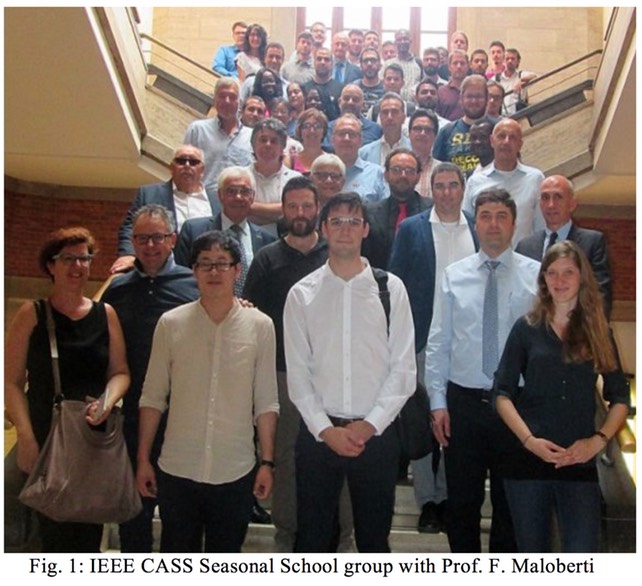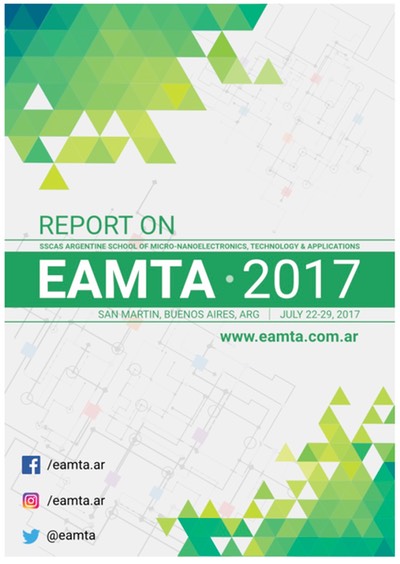IEEE CASS Seasonal School on Enabling Technologies for the Internet-of-Things

The Seasonal School Enabling Technologies for the Internet-of-Things, supported by IEEE CAS Society and by INTEL funding, was held at the School of Engineering, University of Pisa, Italy, from 17th to 28th July 2017 [1], see Fig. 1. The school, organized by Proff. S. Saponara and G. Manara, from University of Pisa, involved in two weeks lecturers from academia (Universities of Pisa and University of Modena and Reggio Emilia in Italy, University of Kiel in Germany, Rovira i Virgili University of Tarragona in Spain, Polytechnic of Grenoble in France) and industry (Intel, STMicroelectronics, LFoundry, Anritsu, Keysight, Stiga, IDS, PurePowerControl, Cubitlab, Zerynth). Moreover, the school hosted two special events, chaired by Prof. S. Saponara, the “2nd Workshop IoT Industry Day” [2] and the “1st Workshop INTEL Functional Safety Day” [3], with the participation of about 70 people per event. As social event a dinner was held in typical Italian restaurant with all students (coming from 17 different countries from Europe, Asia, Africa and South America).
Lecturers discussed new trends in Internet-of-Things (IoT) technologies, considering technological and training aspects, with special focus on electronic and electromagnetic circuits and systems. IoT involves research and design activities both in analog and in digital circuit/signal domains, with issues to be solved for sensors interfacing and conditioning, energy harvesting, low-power signal processing, wireless connectivity, and networking. The Summer School is recognized as an official exam from University of Pisa with 9 ECTS (European Credit Transfer System). A written exam was held by students at the end of the Summer School.

As special lecturers we had the honor to host Prof. F. Maloberti, IEEE CASS President, see Fig. 1, and Dr. F. Faggin, the “father” of the microprocessor, and Dr. Riccardo Mariani, INTEL Senior Research Fellow, see Fig. 2. Functional Safety will be one of the key issue in emerging IoT applications in safety critical domain like industry 4.0, autonomous and connected vehicles and e-health. The world is becoming more and more interconnected. We currently estimate that two hundred billion of smart objects will be part of the IoT by 2020. This new scenario will pave the way to innovative business models and will bring new experiences in everyday life. The challenge is offering products, services and comprehensive solutions for the IoT, from technology to intelligent and connected objects and devices to connectivity and data centers, enhancing smart home, smart factory, Autonomous Driving Cars and much more, while at the same time ensuring the highest safety standards. In safety-critical contexts, where a fault could jeopardize the human life, safety becomes a key aspect. That’s why, Functional Security is among the most important challenges for the future of IoT.
The material of the school will be available through IEEE CASS & River Publishers with the slide and notes book entitled “Enabling Technologies for the Internet of Things: Wireless Circuits, Systems and Networks”.
Web References
[1] https://www.dii.unipi.it/didattica/summer-school-on-enabling-technologies-for-iot
[2] https://www.dii.unipi.it/didattica/summer-school-on-enabling-technologies-for-iot/item/1278.html
[3] https://www.dii.unipi.it/didattica/summer-school-on-enabling-technologies-for-iot/item/1279.html
Sergio Saponara
Dip. Ingegneria dell’Informazione (DII), Università di Pisa, Italy
